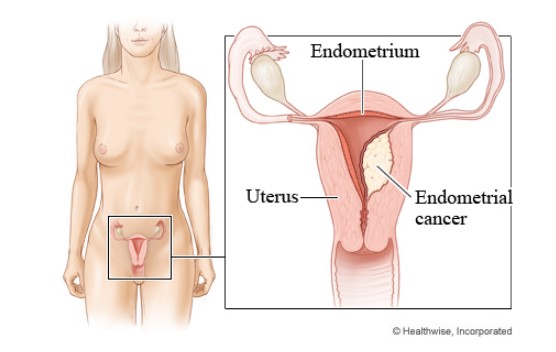What is Uterine Cancer?
What is Uterine Cancer?Uterine cancer is a category of gynecological cancer in which the disease begins in the uterus or womb. Uterine cancers are the most common cancers that occur in the female reproductive system.
Stages of Uterine Cancer
StagesThere are four uterine cancer stages. The higher the stage number, the more advanced the disease.
- Stage I. Cancer is confined to the uterus
- Stage II. Cancer has spread from the uterus to the cervix
- Stage III. Cancer has spread beyond the cervix to the vagina, ovaries, or lymph nodes but is still confined to the pelvic area
- Stage IV. Cancer has spread beyond the pelvic area to other organs or tissues in the body, like the bladder, rectum, or distant organs
Types of Uterine Cancer
TypesUterine cancer includes two different forms of the disease — endometrial cancer and uterine sarcoma. Endometrial cancer is the more common of the two. Many people use the terms “uterine cancer” and “endometrial cancer” interchangeably because of this.
- Endometrial cancer forms in the layer of cells forming the lining of the uterus, also called the endometrium
- Uterine sarcoma develops in the myometrium, the muscle of the uterus, or in one of the other tissues that support the uterus
Symptoms & Signs of Uterine Cancer
SymptomsUterine cancers, such as endometrial cancer, can cause several symptoms.
These uterine cancer symptoms include:
- Abnormal vaginal bleeding or discharge, which may be unusual because of when it appears, such as bleeding after menopause or between periods. Bleeding and/or discharge may also be heavier than usual. Any amount of bleeding after menopause is abnormal.
- Pelvic or abdominal pain
- Pain during intercourse
- Painful urination
Causes & Risk Factors of Uterine Cancer
Causes & Risk FactorsWhile doctors don’t know what directly causes the DNA mutations that lead to uterine cancers, several risk factors can increase your chances of developing the disease. These factors include:
- Age. Older, menopausal people are at a higher risk of developing uterine cancer than younger people. People who have had more periods (including those who began menstruating at an age younger than 12) are also at higher risk.
- Infertility or never having children. People who have never had a child, for any reason, are at a higher risk of uterine cancer
- Hormonal imbalance. Too much estrogen and not enough progesterone in the body will increase your risk of uterine cancer. This can occur as a result of other conditions including polycystic ovary syndrome, diabetes, and obesity.
- Family or personal history. A personal history of breast cancer or ovarian cancer can increase your risk of developing uterine cancer, while a family history of endometrial, ovarian, or colon cancer can do the same
This content has been reviewed by the following medical editors.
Trust NewYork-Presbyterian for Uterine Cancer Care
NewYork-Presbyterian offers the full suite of services for uterine cancers, such as endometrial cancer. If you are concerned you may have uterine cancer, our team of gynecological cancer experts is ready to provide the best care possible. Our teams include gynecologic oncologists, pathologists, radiologists, nurses, and others with the skills and compassion needed to provide top-tier treatment to patients with uterine cancers.




